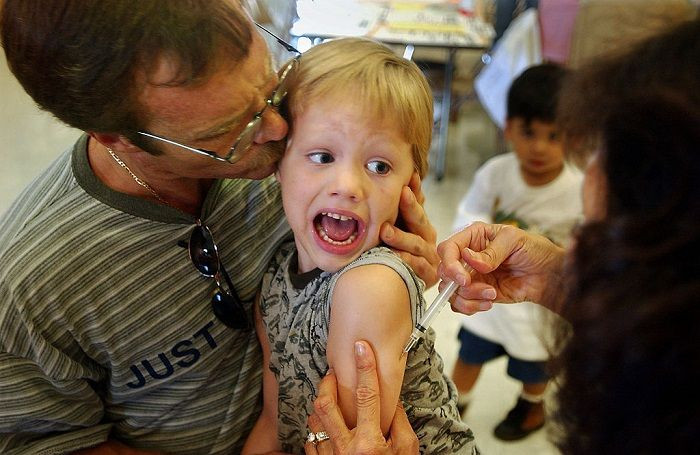Children's Fear Of Needles May Have To Do With Way Parents Behave During Immunization

It's common and totally understandable for children to fear needles. For some, it's so overwhelming that they need a parent or guardian to hold them in bear hug or hold them down in order to get a shot. The thought of a sharp object penetrating the skin is enough to scare anyone, but new research published in the journal Pain suggests parents may actually be to blame.
After researchers at York University studied preschoolers, they found that the anxiety and fear they face in anticipation of a shot is linked to how their parents behaved just a few years ago when it was time for infant vaccinations. Other behavioral influences include the ways parents interact with their children, lead researcher Dr. Rebecca Pillai Riddell said in a statement, "and the types of things they said to their children during infancy and at the preschool age." Riddell runs the Opportunities to Understand Childhood Hurt Laboratory at York.
For their study, researchers observed 202 parents in the Greater Toronto Area and 130 children between 4 and 5 years old. The children were participants in a previous study of 760 children who were followed through immunizations at ages two, four, six and 12-months old. In this current and final wave of the study, researchers were interested in seeing how children developed their fear of needles. This meant asking parents how scared they were before their children received a shot, as well as how scared they thought their children were. Results showed a child's age positively predicted anticipatory distress.
"This strongly suggests that the involvement of parents in pain management interventions during immunization is one of the most critical factors in predicting anticipatory distress to the preschool vaccination," according to researchers.
The fear of needles can have lifelong effects for some children, including a habit of avoiding future medical procedures and appointments. In fact, a 2012 survey found that 23 percent of people who’ve forgone the flu shot cited fear of needles as the reason. And out of the 10 percent of the world’s population who suffer from the fear of needles and injections, at least 20 percent avoid medical treatment, Healthline reported.
"This is a major public health concern and stresses the importance of understanding what leads to needle fear in young children and how we can prevent it," co-researcher Nicole Racine added.
One way parents can ease their children’s fear and anxiety of needles is by reminding them that the injection is necessary for good health. About Kids Health, a pediatric resource from The Hospital for Sick Children in Toronto, suggests parents say something like, “I need to give your injection so you will have lots of energy to play and to grow.” This way, children will have a better understanding of the process. It also helps to follow up the jab with a hug and a kiss, maybe even ice cream.
Source: Racine B. Riddell R, Flora D, Taddio A, Garfield H, Greenberg S. Predicting Preschool Pain-Related Anticipatory Distress: The Relative Contribution of Longitudinal and Concurrent Factors. Pain . 2016.
Published by Medicaldaily.com



























